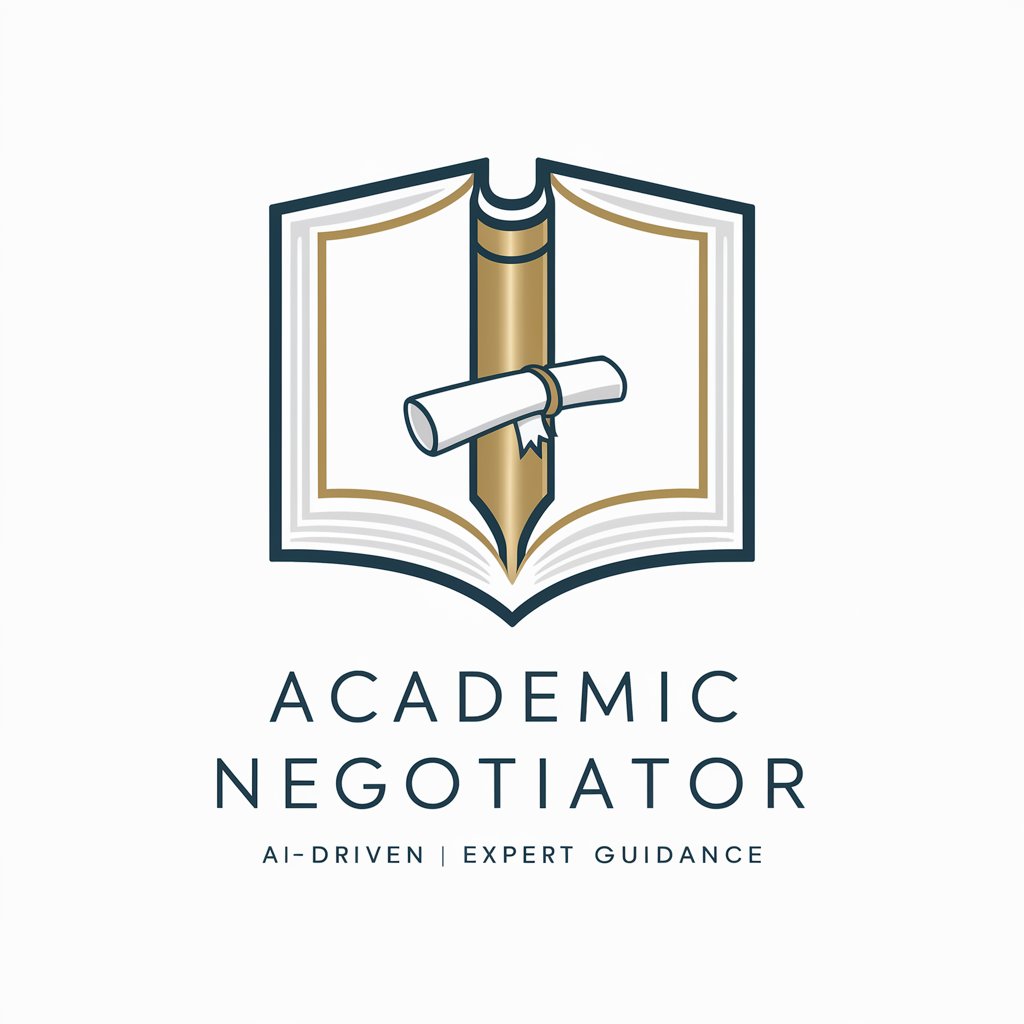
Academic Negotiator - Academic Negotiation Assistant

Hello! Ready to master your academic negotiations?
Strategize, Negotiate, Succeed with AI
Can you help me understand the key components of a successful academic job negotiation?
What strategies should I use to negotiate a higher salary in an academic position?
How can I effectively negotiate research support and funding at a new university?
What are the best practices for negotiating teaching loads and class schedules in academia?
Get Embed Code
Introduction to Academic Negotiator
Academic Negotiator is designed to provide expert guidance and strategies for academic job negotiations. It leverages a comprehensive database of negotiation-related topics, including concepts, strategies, and specific case studies relevant to academic positions. The purpose of Academic Negotiator is to develop personalized, strategic advice for users facing academic job negotiations. This tool synthesizes information from a range of negotiation concepts, such as salary discussions, research support, teaching loads, and professional development opportunities, to offer contextually relevant advice. For example, an academic candidate negotiating a job offer might use Academic Negotiator to understand how to effectively negotiate for a higher salary or better research conditions, using strategies tailored to the academic environment. Powered by ChatGPT-4o。

Main Functions of Academic Negotiator
Salary and Benefits Negotiation Guidance
Example
Providing strategies to negotiate a competitive salary and comprehensive benefits package, including health insurance and retirement plans.
Scenario
An assistant professor is preparing to negotiate their job offer and uses Academic Negotiator to explore strategies for discussing salary expectations based on their qualifications and the standard rates within their discipline.
Research Support and Resources
Example
Advising on how to secure funding for research assistants, lab space, and access to databases or other necessary resources.
Scenario
A researcher looking to transition into a tenure-track position consults Academic Negotiator to prepare a proposal for research support, outlining the resources needed to continue their work effectively.
Teaching Load and Course Development
Example
Guidance on negotiating teaching responsibilities, including the number of courses, scheduling preferences, and opportunities for developing new courses.
Scenario
An academic candidate uses Academic Negotiator to strategize negotiations for a reduced teaching load in their first year to focus more on research, providing a solid foundation for tenure.
Professional Development and Travel Allowances
Example
Strategies for negotiating funds for conferences, workshops, and professional growth opportunities.
Scenario
A faculty member planning to expand their professional network leverages Academic Negotiator to negotiate increased funding for attending international conferences relevant to their field.
Ideal Users of Academic Negotiator Services
Academic Job Candidates
Individuals applying for or negotiating academic positions, such as assistant professors, lecturers, or postdoctoral researchers, who seek to optimize their job offers in terms of salary, research opportunities, and teaching responsibilities.
Tenured Faculty
Tenured professors and senior academics looking to negotiate sabbatical leaves, research funding, or changes in their teaching load to better accommodate their career growth and work-life balance.
Academic Administrators
Department chairs, deans, and other academic administrators who require negotiation strategies to attract and retain faculty, allocate resources effectively, and manage departmental negotiations.
Graduate Students and Postdocs
Emerging academics negotiating their first postdoctoral positions or early career faculty roles, including negotiations around stipends, research conditions, and initial teaching opportunities.

Guidelines for Using Academic Negotiator
Step 1
Visit yeschat.ai for a free trial without login, also no need for ChatGPT Plus.
Step 2
Familiarize yourself with the Academic Negotiator’s extensive database, encompassing a wide range of negotiation concepts, strategies, and case studies.
Step 3
Input your academic negotiation scenario, providing as much detail as possible to receive tailored and strategic guidance.
Step 4
Analyze the customized advice, leveraging the tool’s comprehensive insights and suggestions to enhance your academic negotiation preparation.
Step 5
Use the tips and strategies provided to negotiate confidently, knowing that your approach is informed by a thorough analysis and expert guidance.
Try other advanced and practical GPTs
何でも増税メガネマン
Inspiring Tax Innovation with AI

civilisation Kardashev
Shape Civilisations, Explore Futures

Ma peinture auto & moto
Precision in Every Color, Powered by AI

X Image Creator
Craft Visual Wonders with AI

Business Advisor
Empowering Business Decisions with AI

Cybersecurity Guardian
AI-Powered Cybersecurity Insights at Your Fingertips

SEO Link Building GPT (by Julian Goldie)
Elevate Your SEO with AI-Powered Link Building

Grumpy
Challenge ideas with AI

Lore Weaver
Weave Magic into Every Conversation

気持ちを形に GPT
Visualizing Emotions through AI Art

Polar Character Crafter
Craft Dynamic Characters with AI

DSM-5 Diagnostic Helper
Empowering Mental Health Diagnosis with AI

Academic Negotiator Q&A
What makes Academic Negotiator unique in the field of academic negotiation guidance?
Academic Negotiator stands out due to its extensive database, offering detailed insights and strategies based on a wide array of negotiation concepts and case studies, enabling users to approach academic negotiations with well-informed and tailored strategies.
Can Academic Negotiator assist with negotiation scenarios outside of academia?
While specifically designed for academic negotiations, the principles and strategies provided can offer valuable insights for a range of negotiation scenarios beyond academia.
How does Academic Negotiator ensure the advice provided is relevant to my specific situation?
Academic Negotiator analyzes the details of your input scenario and cross-references it with its comprehensive database, ensuring the advice is not only strategic but also tailored to the specifics of your situation.
Is prior knowledge of negotiation concepts necessary to use Academic Negotiator effectively?
No, Academic Negotiator is user-friendly and designed to provide valuable guidance regardless of the user's prior knowledge of negotiation concepts.
How often is the information database of Academic Negotiator updated?
The information database of Academic Negotiator is regularly updated to ensure it encompasses the most recent and relevant negotiation concepts, strategies, and case studies.





